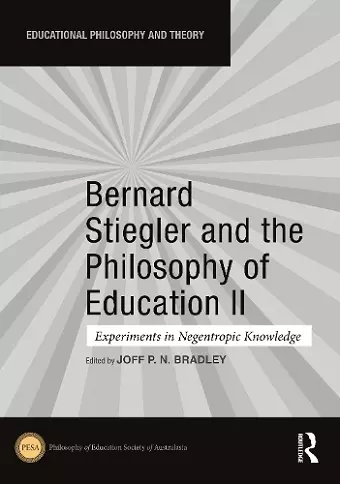Bernard Stiegler and the Philosophy of Education II
Experiments in Negentropic Knowledge
Format:Hardback
Publisher:Taylor & Francis Ltd
Published:22nd Aug '23
Currently unavailable, and unfortunately no date known when it will be back

This is the second volume of research into the philosophy of Bernard Stiegler and its interconnections with the philosophy of education. Building on the first edited collection, Stiegler’s philosophy is introduced to scholars in the field of the philosophy of education in the hope that researchers dig deep into his philosophy and apply it to their own educational context in order to produce new forms of knowledge, that is “negentropic” forms of knowledge which may counter the endemic crises we see in educational institutions in towns, cities and villages across the planet. This second volume throws down the gauntlet to others to find new ways to contest toxic forms of digital life inside and outside education and to challenge entrenched and conservative ways of teaching and learning in the 21st century. The writers in this volume from Australasia, Europe, and across South, Southeast and East Asia do a remarkable job of translating Bernard Stiegler’s sometimes complicated language into ways which are interpretable, applicable and communicable to those who witness, day in day out, in their schools, universities and institutions the struggle to capture the hearts and minds of young people. This book was originally published as a special issue of the journal Educational Philosophy and Theory.
Worldwide, I am not aware of another scholar besides Joff Bradley who so brilliantly negotiates the worlds of Bernard Stiegler and educational philosophy. Nor am I aware of anyone else conducting such a sophisticated yet crisply pertinent application of Bernard Stiegler’s philosophy to problems in education. Bradley astutely observes of Stiegler that "he considers entropy in all its forms (physical, biological and informational) and looks at hyper-consumption and its disavowal as leading to the exhaustion of desire." Likewise, Bradley considers the educational context of Stiegler’s insights into the so-called digital revolution in all its forms.
C. S. Schreiner, University of Guam, Guam
Joff Bradley is one of the leading advocates for Stiegler’s work and in this second volume of his Stiegler project, the contributions not only explore many paths opened by that intriguing philosopher, but also carry our understandings forward, and not least for educational practices.
Ronald Barnett, University College London Institute of Education, UK
Education, transgenerational relationships, attention-formation and the cultivation of care are crucial issues for Bernard Stiegler, both in themselves and for what they mean for the crises we face today. This volume makes an important contribution that goes to the heart of Stiegler’s concerns about the possibility of reinventing a new form of sustainable life on this planet.
Daniel Ross, philosopher, filmmaker and translator of Bernard Stiegler
The invaluable work of Professor Bradley and his colleagues in this collection is an important step in clarifying and promoting Stiegler's philosophy in education.
Roohollah Mozaffaripour, Farhangian University, Iran
In the context of hyper-industrial capitalism, Stiegler's rich conceptual framework offers new weapons in the revitalisation of the university and education more generally. Both creatively applying and challenging Stiegler's work, this excellent collection is replete with singular, insightful, and original contributions apposite to this improbable (not impossible) challenge.
Conor Heaney, University of Kent, England
The authors in this collection each grapple with what it might mean to counter the physical, spiritual and environmental vacuity undergirding the epistemic conditions in academia today. Their engagement with negentropy, which Stiegler understood as a process of resingularisation and differánce, stands out as care-ful reorientation of the philosophy of education across multiple contexts.
Chantelle Gray, North-West University, South Africa
ISBN: 9781032471761
Dimensions: unknown
Weight: 403g
112 pages